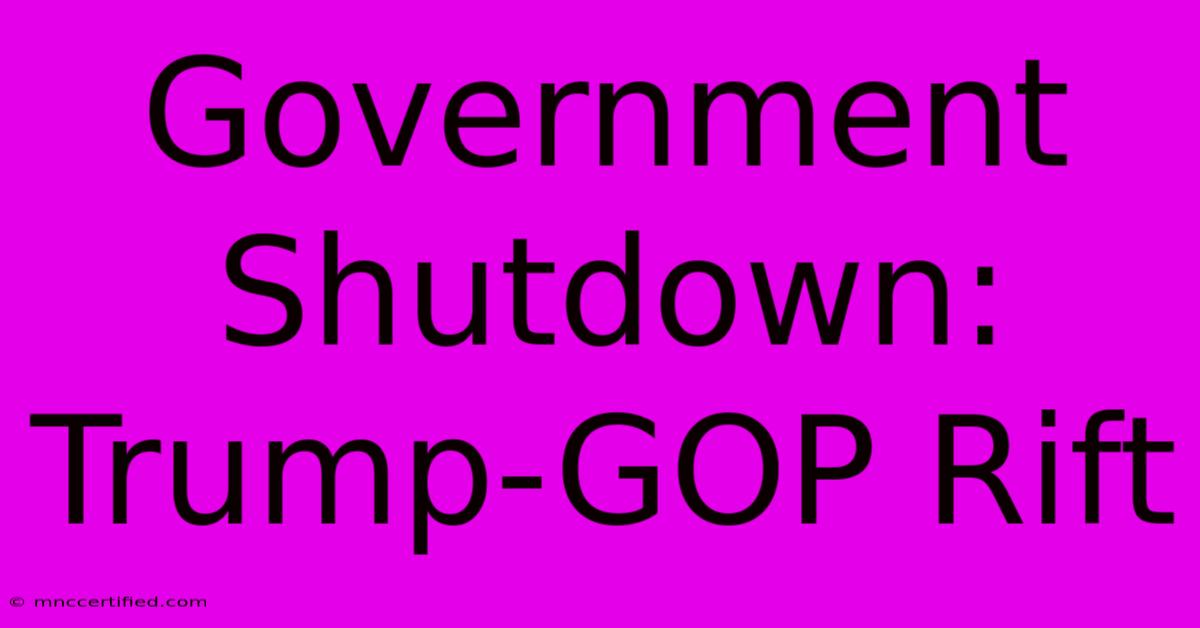Government Shutdown: Trump-GOP Rift

Table of Contents
Government Shutdown: The Deepening Trump-GOP Rift
The 2018-2019 government shutdown, triggered by a clash over funding for President Trump's proposed border wall, exposed a significant rift within the Republican party. This wasn't just a political disagreement; it revealed deep ideological fractures and power struggles that continue to shape American politics today. Understanding this period requires examining the key players, the conflicting priorities, and the lasting consequences of the shutdown.
The Core Issue: Border Wall Funding
The central conflict revolved around funding for President Trump's promised border wall with Mexico. While a majority of Republicans supported the wall in principle, disagreements arose concerning its cost, feasibility, and overall impact. Funding the wall became a litmus test, dividing Republicans into factions with differing levels of loyalty to the President and their own political priorities.
Trump's Stance: Unwavering Demand
President Trump staked his presidency on the wall, repeatedly emphasizing its necessity for national security and immigration control. He framed any compromise as a sign of weakness and portrayed Democrats as obstructionists unwilling to prioritize border security. This unwavering stance, coupled with his frequent use of Twitter to attack opponents, further escalated the tensions.
GOP Divisions: Moderates vs. Trump Loyalists
The Republican party itself was far from unified. Moderate Republicans, concerned about the wall's cost and effectiveness, struggled to reconcile their fiscal conservatism with their allegiance to the President. This created a significant internal conflict. Some openly challenged Trump's approach, while others remained silent to avoid antagonizing the President and his loyal base. This internal struggle became a prominent feature of the shutdown, undermining Republican unity and effectiveness.
The Senate's Role: A Battleground for Compromise
The Senate, with its more moderate Republican wing, became a key battleground. Senate Majority Leader Mitch McConnell, while supporting the President, ultimately sought a path toward a compromise that avoided a protracted shutdown. However, he faced immense pressure from both the Trump administration and hardline Republicans who demanded unwavering support for the wall. This internal pressure significantly limited McConnell's negotiating flexibility.
Consequences of the Shutdown: Far-Reaching Impacts
The government shutdown had far-reaching consequences, impacting various government services and negatively affecting the economy. Non-essential government services were suspended, leading to furloughs for hundreds of thousands of federal employees and delays in vital programs. The uncertainty also created economic instability and damaged America's international image.
Long-Term Political Damage: Erosion of Trust
Beyond the immediate consequences, the shutdown significantly damaged the Republican party's image. The internal divisions and perceived lack of leadership fueled public dissatisfaction and further eroded trust in the political process. The shutdown highlighted the challenges of governing with a deeply divided party and a President who prioritized loyalty above all else.
The Aftermath: Lessons Learned (or Not Learned?)
The 2018-2019 government shutdown serves as a case study in political gridlock and the dangers of ideological extremism. While some might argue lessons were learned, subsequent political events suggest otherwise. The ongoing debates surrounding immigration and border security, coupled with the continued polarization of American politics, highlight the enduring impact of this period.
Off-Page SEO Considerations:
To boost the search ranking of this article, consider the following off-page SEO strategies:
- Link Building: Reach out to relevant news websites, political blogs, and academic journals focusing on US politics to secure backlinks to your article.
- Social Media Promotion: Share the article on relevant social media platforms, engaging with users and encouraging discussions.
- Guest Posting: Write guest posts on authoritative websites in the political sphere, subtly linking back to your article.
- Community Engagement: Participate in online forums and discussions related to US politics and the Trump presidency, providing insightful comments and linking to your article where appropriate.
By implementing both on-page and off-page SEO techniques, this article has a greater chance of achieving high rankings in Google search results for relevant keywords like "government shutdown," "Trump GOP rift," "border wall funding," and similar terms. Remember to consistently update and refresh the content to maintain relevance and attract a wider audience.

Thank you for visiting our website wich cover about Government Shutdown: Trump-GOP Rift. We hope the information provided has been useful to you. Feel free to contact us if you have any questions or need further assistance. See you next time and dont miss to bookmark.
Featured Posts
-
2025 Simpsons End On Channel 4
Dec 19, 2024
-
Small Plane Crash Two Fatalities Honolulu
Dec 19, 2024
-
Southampton Water Shortage 58 000 Homes
Dec 19, 2024
-
Cal Anderson Memorial Washington Location Set
Dec 19, 2024
-
White Christmas Met Office Forecast
Dec 19, 2024